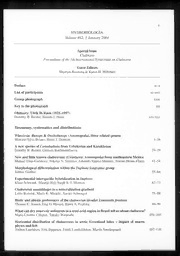
Hydrobiologia 2001: Vol 442 Table of Contents PDF
Preview Hydrobiologia 2001: Vol 442 Table of Contents
HYDROBIOLOGIA Volume 442, | January 2001 Special Issue Cladocera Proceedings of the 5th International Symposium on Cladocera Guest Editors Maarten Boersma & Karen H. Wiltshire Preface <x List of participants XI-XVII Group photograph XVill Key to the photograph XiX Obituary: Ulrik Ib Regen (1925-1997) Dorothy B. Berner, Brenda J. Hann XXI—XXV Taxonomy, systematics and distributions Wlassicsia, Bunops & Onchobunops (Anomopoda), three related genera Marcelo Silva-Briano, Henri J. Dumont 1-28 A new species of Ceriodaphnia from Uzbekistan and Kazakhstan Dorothy B. Berner, Gulnara Rakhmatullaeva 29-39 New and little known cladocerans (Crustacea: Anomopoda) from southeastern Mexico Manuel Elfas-Gutiérrez, Nikolai N. Smirnov, Eduardo Sudrez-Morales, Noemi Dimas-Flores Morphological differentiation within the Daphnia longispina group Sabine GieBler Experimental interspecific hybridization in Daphnia Klaus Schwenk, Maartje Bijl, Steph B. J. Menken Cladoceran assemblages in a mineralization gradient Loles Boronat, Maria R. Miracle, Xavier Armengol 75-88 Biotic and abiotic preferences of the cladoceran invader Limnosida frontosa Thomas C. Jensen, Dag O. Hessen, Bjorn A. Faafeng 89-99 What can dry reservoir sediments in a semi-arid region in Brazil tell us about cladocera? Maria Cristina Crispim, Takako Watanabe 101-105 Horizontal distribution of cladocerans in arctic Greenland lakes — impact of macro- phytes and fish Torben Lauridsen, Erik Jeppesen, Frank Landkildehus, Martin S@ndergaard 107-116 Vi Zooplankton on the move: first results on the quantification of dispersal of zooplankton in a set of interconnected ponds Erik Michels, Karl Cottenie, Liesbeth Neys, Luc De Meester 117-126 Feeding, growth and reproduction Study of the late embryogenesis of Daphnia (Anomopoda, ‘Cladocera’, Branchiopoda) and a comparison of development in Anomopoda and Ctenopoda Alexey A. Kotov, Olga S. Boikova 127-143 Intersex and male development in Daphnia magna Suzanne E. Mitchell 145-156 Life-history variation related to the first adult instar in daphnids derived from diapaus- ing and subitaneous eggs Kestutis ArbaCiauskas 157-164 Reduction of the filtration rate of Daphnia galeata by dissolved photosynthetic products of edible phytoplankton Annekatrin Wagner, Norbert Kamjunke 165-176 Clearance rates and prey selectivity of the predaceous cladoceran Polyphemus pediculus Anne T. Packard 177-184 Predator—prey interactions The influence of fish kairomones on the induction and vertical distribution of sexual individuals of the Daphnia galeata species complex Piet Spaak, Maarten Boersma 185-193 The presence of fish induces the quick release of offspring by Daphnia Andrzej Mikulski 195-198 Does trimethylamine induce life-history reactions in Daphnia? Sandra Lass, Maarten Boersma, Karen Helen Wiltshire, Piet Spaak, Hinnerk Boriss 199-206 The effects of food and temperature regimes on life-history responses to fish kairomones in Daphnia hyalina x galeata Arve Dokseter, Jacobus Vijverberg 207-214 Daphnia galeata \ife history response to heterogeneous food conditions and dissolved chemicals in the Rimov Reservoir Jiri Machaéek Predation on Daphnia pulex by Lepidurus arcticus Kirsten Christoffersen Foraging behaviour of planktivorous fish in artificial vegetation: the effects on swimming and feeding Tilak Priyadarshana, Takashi Asaeda, Jagath Manatunge 231-239 Predation and competition in zooplankton communities Reproductive potential of Daphnia galeata in relation to food conditions: implications of a changing size-structure of the population Stephan Hiilsmann 241-252 Do fast increasing food conditions promote the midsummer decline of Daphnia galeata? Hanno Voigt, Stephan Hiilsmann 253-259 The transfer of fatty acids in a freshwater planktonic foodweb of the Kuibyshevskoe reservoir (middle reaches of the Volga) Eugene A. Bychek, Irina A. Guschina 261-268 Carbon as an indicator of Daphnia condition in an alpine lake Monika Winder, Piet Spaak 269-278 Competitive ability of Daphnia under dominance of non-toxic filamentous cyanobacteria Rainer Kurmayer 279-289 Species-specific population-density thresholds in cladocerans? Z. Maciej Gliwicz 291-300 Distribution patterns and predation risk of the coexisting cladocerans Bythotrephes longimanus and Leptodora kindtii in a large lake - Lake Constance Annette Palmer, Hans-Bernd Stich, Gerhard Maier 301-307 Did chironomid emergence release Daphnia from fish predation and lead to a Daphnia- driven clear-water phase in Lake Towada, Japan? Wataru Makino, Hideo Kato, Noriko Takamura, Hitoshi Mizutani, Noboru Katano, Hajime Mikami 309-317 Seasonal dynamics of metabolic activity of the Daphnia community in Lake Bled (Slovenia) Tatjana Siméi¢, Anton Brancelj 319-328 Fish and crustaceans in northeast Greenland lakes with special emphasis on interactions between Arctic charr (Salvelinus alpinus), Lepidurus arcticus and benthic chydorids Erik Jeppesen, Kirsten Christoffersen, Frank Landkildehus, Torben Lauridsen, Susanne L. Amsinck, Frank Riget, Martin Sondergaard 329-337 Zooplankton community structure and environmental conditions in a set of interconnec- ted ponds Karl Cottenie, Nele Nuytten, Erik Michels, Luc De Meester 339-350
